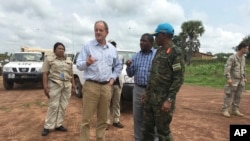The head of the U.N. mission in South Sudan has condemned a recent wave of rapes and sexual assaults on women and girls near the town of Bentiu.
"These attacks on vulnerable civilians are absolutely abhorrent and must stop. The violent assaults happened in a government-controlled area and it has primary responsibility for the safety of civilians," said David Shearer, chief of the United Nations Mission in South Sudan, UNMISS.
Doctors Without Borders reported the attacks last week. The medical aid group said it treated 125 women and girls who were raped, beaten and brutalized in South Sudan's Rubkona County between Nov. 19 and 29.
Shearer told reporters in Juba the attacks happened as the women walked along roads near the towns of Nhialdu and Guit on their way to a food distribution center in Bentiu.
"They report the attacks as having been carried out by young men in civilian clothing or military uniforms," Shearer said.
He said UNMISS has stepped up patrols in the area, and urged commanders of armed groups operating in the area to control their troops.
Sudan Sudan People's Defense Forces Spokesman Major General Lul Ruai Koang denied government soldiers assaulted women and girls in the area but said the government would investigate the matter.
"We are not responsible for the alleged rapes, that were allegedly committed from the 19th to 29th, however we are going to do our own investigation, and should we find some elements within our forces responsible for this, they will be held accountable," Koang told South Sudan in Focus.
Koang claimed several criminals come from U.N.-run camps, and accused rebel SPLA-IO forces of crossing through government-controlled areas on their way to U.N. Protection of Civilian sites (POCs).
Colonel Lam Paul Gabriel, the SPLM-IO deputy spokesperson, denied that rebel fighters carried out the assaults and said the government in Juba must take responsibility when its soldiers commit serious offenses against civilians.
He also said the stakeholders who signed the September revitalized peace agreement must establish cantonment sites so criminals can be easily identified.
"We are not really responsible for attacks on the civilians or for those harassment that happened, especially the rape cases but as human beings we can rule out some unruly soldiers and we have set a committee to investigate and we will find exactly where these people came from," Gabriel told South Sudan in Focus.
The U.N. mission said Wednesday that human rights investigators are on a plane to South Sudan to look into the situation.
"One rape is too many," said Andrea Cullinan from the United Nations Population Fund in a statement. "This is a case of the break-down of rule of law."





